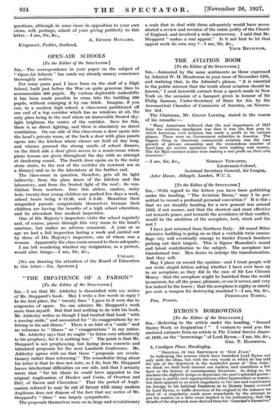OPEN-AIR SCHOOLS
[To the Editor of the SPECTATOR.] SIR,—The correspondence in your paper on the subject of " Open-Air Schools " has made my already uneasy conscience thoroughly restive.
For some years past I have been on the staff of a High School, built just before the War on quite generous lines to accommodate 200 pupils. By various deplorable makeshifts it has been made possible to cram into the building 260 pupils, without enlarging it by one brick. Imagine, if you can, in a modern high school, a class-room partitioned off one end of a top corridor which has no windows at all, the only glass being in the roof where an immovable frosted sky- light brightens the centre of the corridor. Save for this, there is no direct lighting, and there is absolutely no direct ventilation. On one side of this class-room a door opens into the head's private room, at the back a door with glass panels opens into the kitchen where classes are held all day long, and whence proceed the strong smells of school dinners, on the third side a door gives access to a music-room where piano lessons are given throughout the day with no attempt at deadening sound. The fourth door opens on to the noisy stone stairs, to the rest of the corridor (in constant use as a library) and so to the laboratory at the further end.
The class-room in question, therefore, gets all its light indirectly, from the glass doors of the kitchen and the laboratory, and from the frosted light of the roof ; its ven- tilation from nowhere. Into this airless, sunless, noisy hole, twenty-four young children are packed five days a week, school hours being 9-12.30, and 2-3.30. Meantime their misguided parents congratulate themselves because their children are having the benefits of a high school education, and its attendant free medical inspection.
One of His Majesty's inspectors visits the school regularly and, of course, passes through this very room to the head's sanctum, but makes no adverse comment. A year or so ago we had a full inspection lasting a week and carried out by three of His Majesty's inspectors, one of whom was a woman. Apparently the class-room seemed to them adequate.
I am left wondering whether my resignation, as a protest, would alter things.—I am, Sir, &c.,
UNEASY.
[We are drawing the attention of the Board of Education to this letter.—En. Spectator.]






















































 Previous page
Previous page